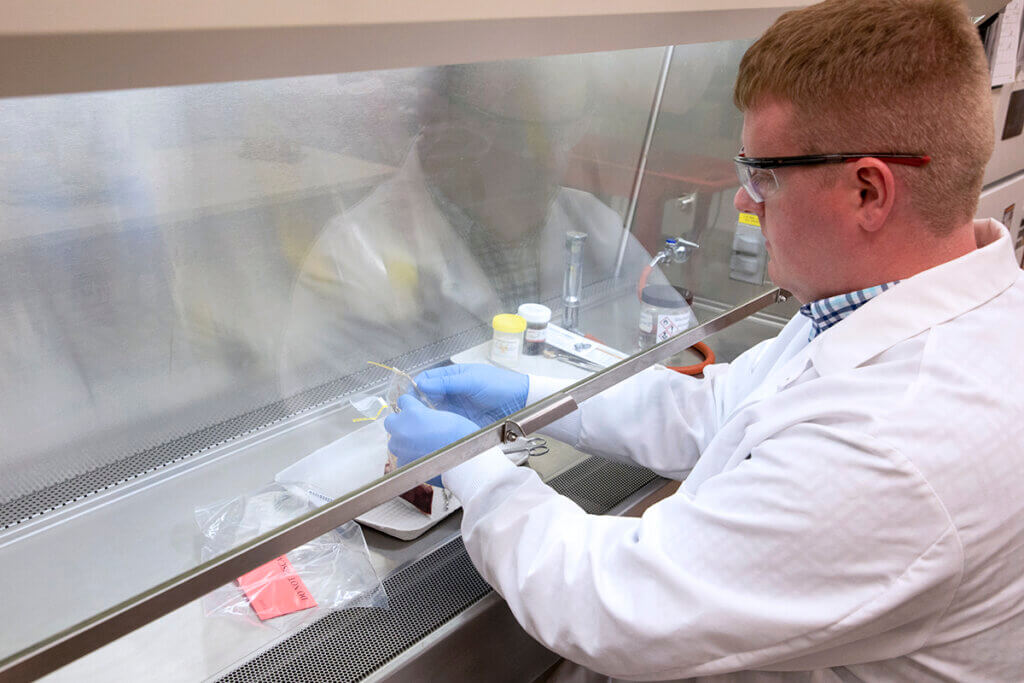
A new two-year appropriations budget adopted by the Indiana General Assembly this spring contains good news for the Animal Disease Diagnostic Laboratory (ADDL) at Purdue University. A key priority for the laboratory was to make the case for increased state funding to support its mission of helping Indiana veterinarians, animal health officials, livestock producers, and animal owners in protecting the health of the animal population by providing prompt, accurate, and reliable diagnoses of animal diseases, including those that may affect the human population.
The ADDL is an individual line item in the state budget. The new two-year state budget increases the laboratory’s annual appropriation to $5 million per fiscal year, which represents an increase of $1,288,439 per fiscal year. The ADDL also was included in the budget for Purdue capital projects and capital appropriations, to the tune of $5 million for laboratory upgrades.
“It’s hard to put into words how much I appreciate all the groups and individuals who advocated for the ADDL at the Statehouse this spring,” said Dr. Kenitra Hendrix, Animal Disease Diagnostic Laboratory director and clinical associate professor of veterinary diagnostic microbiology in the Purdue University College of Veterinary Medicine’s Department of Comparative Pathobiology. “We received an unprecedented 35% increase to our recurring funding. This is going to set us on the path to be able to improve our client services by expanding our team.” The ADDL now currently is seeking to fill two new positions. One is a veterinary diagnostician and pathologist at the ADDL’s facility in Dubois, Indiana in the southwestern part of the state, known as the Heeke Lab. The other is a client services veterinarian at the ADDL in West Lafayette.
Dr. Hendrix also explained that the increased ADDL funding will enable the laboratory to upgrade its computer software system, which also will improve the customers’ experience. “That upgrade will be very critical for all future improvements at the lab because everything is digital these days, so we need to have a very effective user-friendly system in place for managing our case data.”

Dr. Hendrix emphasized that the additional staffing and upgrades will help the ADDL quickly identify and stop the spread of major livestock diseases, such as Highly Pathogenic Avian Influenza, African Swine Fever, and Foot-and-Mouth Disease. “We are poised and ready to respond to these high consequence diseases — we’re certainly watching the news as well,” Dr. Hendrix said. “We have staff trained on the official protocols for these high consequence diseases so having additional funding helps us maintain our staffing and expand our efforts in this very important area.”
The support of many individuals and Indiana ag agencies all contributed to the successful outcome of the state budget process for the ADDL, according to Dr. Hendrix. “I am deeply appreciative of the support of the many state lawmakers who approved the additional state support and the Indiana ag agencies that advocated on behalf of the ADDL,” Dr. Hendrix said. “The Indiana State Poultry Association, Indiana Pork Producers, American Dairy Association Indiana, Indiana Soybean Alliance, the Indiana State Board of Animal Health, Indiana Farm Bureau, and the ADDL’s own advisory committee all recognize the critical role that the ADDL plays in support of Indiana’s agriculture. Their efforts to get that important message to the decision-makers in Indianapolis was invaluable in the successful effort to secure the increased state funding for the ADDL.”
Other specific line items in the state budget related to Purdue that received increases in annual appropriations included County Agricultural Extension Educators (funding raised to $8 million per fiscal year) and Agricultural Research and Extension – Crossroads (funding raised to $9 million per fiscal year). Purdue also received funding for other capital projects and capital appropriations, besides the ADDL upgrades, including the Purdue Fort Wayne School of Music building ($15 million); regional deferred maintenance ($4,224,138); and repair and rehabilitation ($15,101,111 per fiscal year).
Overall, the new state budget provides a 4% increase in operating funding for Purdue for fiscal year 2024 and a 6% increase for FY 2025 — the most significant infusion of new dollars in operating appropriations that higher education in the state has received in many years. A portion of that operating funding is contingent on the Indiana Commission for Higher Education adopting its new Outcomes-based Performance Funding formula, which is expected in the next few months. The new state budget also includes funding for the ongoing establishment of Purdue University in Indianapolis and construction of the Clinical Education Building for Pharmacy and Nursing.
“On behalf of our students, faculty, and staff, we extend our sincere appreciation to the Indiana General Assembly for its generous support of Purdue University that met almost all of the requests we submitted for the next two fiscal years. We are excited to receive funding for all three capital projects in West Lafayette, Indianapolis, and Fort Wayne. General operating appropriation is rising while Purdue Extension, ADDL, and facility renovation all benefit from the significant increase,” Purdue President Mung Chiang said. “We continue our commitment to be excellent stewards of these valuable tax dollars, including the transition and recurrent budget for Purdue University in Indianapolis — Purdue’s first urban campus.”
Click here to view a complete news release about the university’s funding in the state’s new biennial budget. Click here to view a story about the ADDL’s funding increase in Hoosier Ag Today. Click here to learn more about employment opportunities at the Animal Disease Diagnostic Laboratory.





